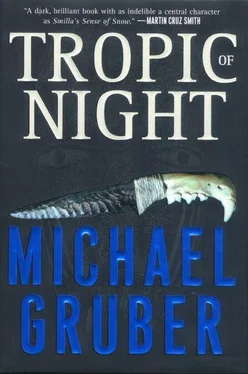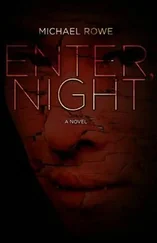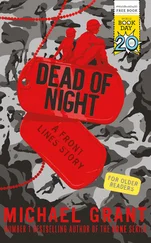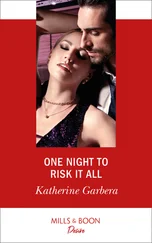Michael Gruber - Tropic of Night
Здесь есть возможность читать онлайн «Michael Gruber - Tropic of Night» весь текст электронной книги совершенно бесплатно (целиком полную версию без сокращений). В некоторых случаях можно слушать аудио, скачать через торрент в формате fb2 и присутствует краткое содержание. Жанр: Полицейский детектив, на английском языке. Описание произведения, (предисловие) а так же отзывы посетителей доступны на портале библиотеки ЛибКат.
- Название:Tropic of Night
- Автор:
- Жанр:
- Год:неизвестен
- ISBN:нет данных
- Рейтинг книги:4 / 5. Голосов: 1
-
Избранное:Добавить в избранное
- Отзывы:
-
Ваша оценка:
- 80
- 1
- 2
- 3
- 4
- 5
Tropic of Night: краткое содержание, описание и аннотация
Предлагаем к чтению аннотацию, описание, краткое содержание или предисловие (зависит от того, что написал сам автор книги «Tropic of Night»). Если вы не нашли необходимую информацию о книге — напишите в комментариях, мы постараемся отыскать её.
Tropic of Night — читать онлайн бесплатно полную книгу (весь текст) целиком
Ниже представлен текст книги, разбитый по страницам. Система сохранения места последней прочитанной страницы, позволяет с удобством читать онлайн бесплатно книгу «Tropic of Night», без необходимости каждый раз заново искать на чём Вы остановились. Поставьте закладку, и сможете в любой момент перейти на страницу, на которой закончили чтение.
Интервал:
Закладка:
A middle-aged, brass-haired, leathery woman in a nice grass-green cotton suit stepped out from between two parked cars and stood in their way.
“What’s up, guys? I hear it’s bad.” Doris Taylor had been the crime reporter for the Miami Herald since shortly after the invention of movable type, and she was good at it, which meant that Barlow ignored her and Paz cultivated her. Paz was a modern cop and understood publicity and what it could do for one’s career, while Barlow thought that reporters and the people who read them were ghouls and unclean spirits. It was an area where the two men had agreed to disagree. Barlow stepped around Taylor without a word, as if she were a dog dropping, while Paz smiled, paused, said, “Call me,” in a low voice, and moved on. Taylor flashed a grin at Paz, flipped a bird at Barlow’s retreating back, and walked back to the murder scene to gather color.
At the next corner, Raymond Wallace, brother to the deceased, was waiting in a patrol car with a uniformed officer. Paz recognized him from the graduation picture in the apartment. He was in the backseat with his head resting against the rear deck, looking stunned. The rear door of the car was open for air, and to demonstrate that the young man was not a prisoner. Like many of the people associated with the morning’s activities, he had thrown up, and his brown skin had an unhealthy gray cast to it. Barlow stuck his head in the window. “Mr. Wallace, we’re going to head back to the station now so you can make your statement.” Raymond Wallace sighed and slid from the car. Paz noticed that his eyes were reddened and there was a splash of yellow puke on the toe of one of his white AJ’s.
“Can I call my mother?” Wallace asked.
“You need to let us do that, sir,” said Barlow.
“Why? She gonna be worried sick if I don’t call and say why I’m not back yet.”
They arrived at Paz’s car. Barlow said, “The reason is that when there’s a homicide it’s important that the police are the first people to tell the family about it. Sometimes we learn important things from their reaction.”
“You think my momma connected up with …”
“No, of course we don’t, sir, but we have to do everything according to the book. And I’d like to say now, sir, how sorry I am about your loss.”
He meant it, too, thought Paz. He feels for these people, for all of them, the bad guys and the victims both, and yet it doesn’t reduce his heart to slag and pus. Paz himself did not let himself feel anything but the coldest and most refined anger.
They traveled down Second Avenue in silence to Fifth, to the police station, a newish six-story dough-colored concrete fortification. In one of the interview rooms in the homicide unit’s fifth-floor office Raymond Wallace told his story. He lived with his mother in Opa-Locka, northwest of the city, in their own house. He’d taken his mother’s car to pick up his sister. They were going to go to a mall to buy baby things. Here he broke down. Barlow let him recover himself. Paz asked him about the missing picture and got a blank stare.
Barlow changed the subject to the family. There was just him and his sister. His father had been an air force sergeant, dead five years. His mother lived on the pension. He was a student at Miami-Dade. His sister had wanted to be a hairdresser and was studying for her license. The father of the baby was Julius Youghans, an older man, resident in Overtown. Youghans had a pickup truck and did light hauling and odd jobs. No, his mother had not approved of the relationship, but only because Youghans was not a member of their church, not a churchgoing man at all.
Paz and Barlow exchanged a look. Barlow said, “Mr. Wallace, was your sister a churchgoing woman?”
“Well, we was both raised in the church. My momma’s a amen-corner lady, you know? But, you know, you get older, sometimes you tend to drift away. I went. Dee, she didn’t always make it.”
“This was from when she started going with Mr. Youghans?”
“Well, yeah, but she been kicking back at it for some years now. Then she got pregnant, you know, and like, that set Momma off on her, and she didn’t like coming around. I got to be like one of those UN guys going back and forth.”
“Uh-huh. Did you have any idea that your sister or her boyfriend was involved in another kind of religion?”
Wallace knotted his brows. “What you mean, like Catholic?”
“No, sir, I mean like a cult.”
A startled expression crossed Wallace’s face. “Like that Cuban shit?”
“Well, anything out of the ordinary, something new she might’ve just got into. Or him.”
The young man thought for a moment, then shook his head. “Not that she ever told me. Of course, since she been going with Julius, we ain’t been that close. But … nah, I kind of doubt it. Dee’s like more of a down-to-earth sort of girl. Was.” A pause here. “There was that fortune-telling thing, if that’s what you mean by something new.”
“And what was that about?”
“Oh, well, she told us, it must’ve been two, three weeks back, she found this fortune-teller dude, and she used to go to him for like, what d’you call ‘em, readings? And anyway, he gave her a number and it hit. That’s how she got that couch and TV and shit. So she was pretty pumped on him for a while.”
“Do you know this man’s name or where we can get ahold of him?”
“Nah, it was some African name. Like Mandela: Mandoobu, Mandola? I can’t remember. She didn’t say much about him. Look, could I just call my mom now? I already told you everything I know, and if I don’t get back to my car there ain’t gonna be nothing but wheels left …”
The two detectives agreed with a glance and sent Raymond Wallace off with a uniform for a drive back to his car, with the cop given private instructions to take his time. Paz drove to Opa-Locka with Barlow beside him, keeping under the speed limit, as Barlow preferred, wishing he could smoke a cigar, something Barlow deplored. Paz imagined he put up with Barlow because the man was a superb detective and because Barlow’s tolerance of Paz gave Paz a certain standing in a department that by and large disliked him. Kissing Barlow’s ass (if that’s what this was) obviated the necessity of bestowing such kissing elsewhere.
The interview with Mrs. Wallace went as these things always did. The Wallaces had imagined that by staying straight, and getting married, and remaining so, and going to church, and pursuing a respectable and honorable life in the military, and moving at last to a reasonably stable lower-middle-class community they could avoid the current Kindermord of the black people, but no. Paz sat in his cool and watched Barlow handle the hysterics. Mrs. Wallace was a hefty woman and took some handling. Peace restored, calls made, neighbor ladies flocking inward, in a ritual of comfort lamentably too well oiled, the two cops got to ask some questions. They learned that Deandra had left home after an argument, had used her survivor’s benefits to pay for the apartment in “that awful neighborhood,” had started to take courses in beauty school. The detectives learned that beauty school had not been the summit of the Wallaces’ dreams for their girl, but kids today … what could you do? Mrs. Wallace had never been in her daughter’s apartment, and she confirmed her son’s story of their estrangement over her affair with Julius Youghans. Julius Youghans was high on Mrs. Wallace’s list of suspects.
“Did he ever threaten your daughter, Mrs. Wallace?” Paz asked.
“He didn’t want her baby, that was for sure,” said the woman. “Julius, he just wanted the one thing.”
By this time, Mrs. Wallace was surrounded by neighbor ladies fanning her with palm fans and paper church fans, and comforting her with the homilies of their desperate, bone-hard religion. After some routine questions confirming the whereabouts of her and her son on the previous night, the detectives left their cards and departed.
Читать дальшеИнтервал:
Закладка:
Похожие книги на «Tropic of Night»
Представляем Вашему вниманию похожие книги на «Tropic of Night» списком для выбора. Мы отобрали схожую по названию и смыслу литературу в надежде предоставить читателям больше вариантов отыскать новые, интересные, ещё непрочитанные произведения.
Обсуждение, отзывы о книге «Tropic of Night» и просто собственные мнения читателей. Оставьте ваши комментарии, напишите, что Вы думаете о произведении, его смысле или главных героях. Укажите что конкретно понравилось, а что нет, и почему Вы так считаете.












